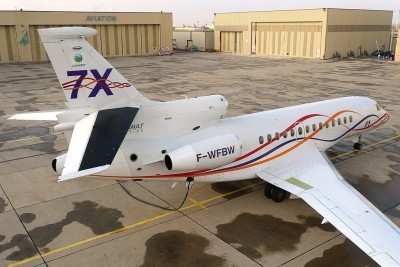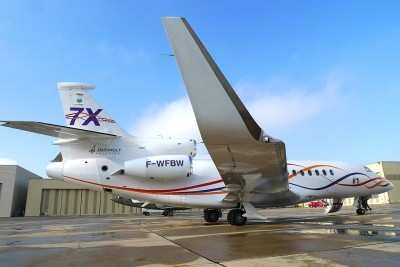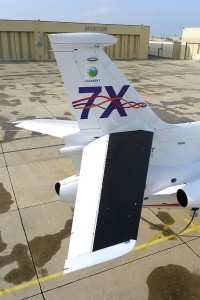Thu, Jan 27, 2011
Part Of Europe’s Clean Sky Research Program
Dassault Aviation recently performed a successful flight test to
evaluate potential applications of a laminar wing for large
business jets. The flight was performed with a Falcon 7X at
Dassault’s Flight Test Center in Istres, France. The tests
are part of the "Smart Fixed Wing Aircraft", one of the Integrated
Technology Demonstrators of the European Clean Sky Initiative.
Clean Sky, one of Europe’s largest research initiatives ever,
aims to develop technologies for cleaner and quieter
next-generation aircraft which will enter service beyond 2020.

The flight evaluated a new infrared (IR) camera technology,
developed by FLIR, which is capable of measuring temperature
gradients in high altitude/low temperature and pressure
environment. The camera measured differences in surface
temperatures between laminar and turbulent areas of the horizontal
tail plane on the Falcon 7X. While the Falcon 7X is not based on a
laminar design, at high altitudes a laminarity of up to 40% was
predicted on the upper surface of the horizontal tail. Measurements
from the IR camera placed at the top of the vertical tail were
performed to provide experimental validation.

”The results, which are still under analysis by Dassault
Aviation and ONERA, (the French national aerospace research center)
do show laminar extensions as expected,” said Philippe
Rostand, Future Falcon Programs Project Manager. “The tests
also permitted us to qualify new measurements techniques and
equipment that will be used in future test flights to be flown by
Dassault, Airbus and the other European partners on an even larger
scale, such as the ‘smart laminar wing’ that will be
flight tested in 2014 on a modified Airbus A340-300 test
aircraft.”
Among other aerodynamic innovations, a laminar wing offers the
largest potential for a dramatic decrease in drag. Laminar wings
are currently only used on sail planes and small business jets.
Initial studies indicate a potential 5-10% drag decrease and
corresponding reduction in fuel burn and CO2 emissions with a
laminar wing design on a large aircraft. Demonstrations and
analysis on a larger scale have yet to be performed to confirm
possible efficient and safe application on larger
aircraft.

Dassault Aviation previously performed a series of successful
test flights with an experimental laminar airfoil from 1986-1989 on
a modified Falcon 50. “Today, better measurement tools and
production methods are in place to implement what we’ve
learned so that we can someday bring these exciting findings into
reality,” said Rostand.
More News
Aero Linx: International Federation of Airworthiness (IFA) We aim to be the most internationally respected independent authority on the subject of Airworthiness. IFA uniquely combi>[...]
Ultrahigh Frequency (UHF) The frequency band between 300 and 3,000 MHz. The bank of radio frequencies used for military air/ground voice communications. In some instances this may >[...]
A Few Questions AND Answers To Help You Get MORE Out of ANN! 1) I forgot my password. How do I find it? 1) Easy... click here and give us your e-mail address--we'll send it to you >[...]
From 2019 (YouTube Edition): Learning To Paint Without Getting Any On Your Hands PPG's Aerospace Coatings Academy is a tool designed to teach everything one needs to know about all>[...]
Also: Sustainable Aircraft Test Put Aside, More Falcon 9 Ops, Wyoming ANG Rescue, Oreo Cookie Into Orbit Joby Aviation has reason to celebrate, recently completing its first full t>[...]
 ANN's Daily Aero-Linx (05.06.25)
ANN's Daily Aero-Linx (05.06.25) ANN's Daily Aero-Term (05.06.25): Ultrahigh Frequency (UHF)
ANN's Daily Aero-Term (05.06.25): Ultrahigh Frequency (UHF) ANN FAQ: Q&A 101
ANN FAQ: Q&A 101 Classic Aero-TV: Virtual Reality Painting--PPG Leverages Technology for Training
Classic Aero-TV: Virtual Reality Painting--PPG Leverages Technology for Training Airborne 05.02.25: Joby Crewed Milestone, Diamond Club, Canadian Pilot Insurance
Airborne 05.02.25: Joby Crewed Milestone, Diamond Club, Canadian Pilot Insurance





